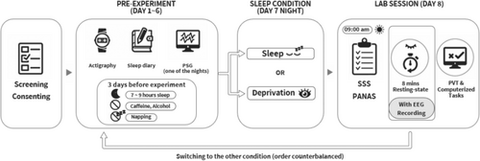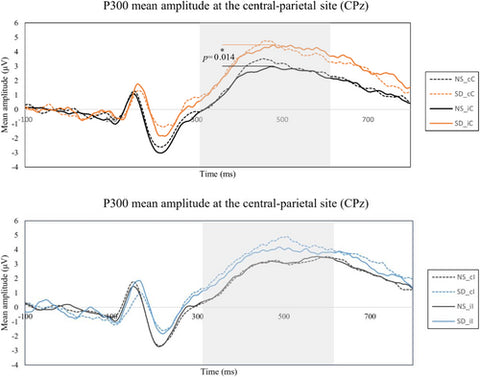Imagine facing a sleepless night, not by choice, but as part of a scientific study aimed at exploring the depths of how sleep deprivation affects our mind and emotions.
That's exactly what 25 healthy young adults experienced in this groundbreaking research published in the Journal of Sleep Research. They were asked to undergo two different experimental conditions: a normal night of sleep, enjoyed in the comfort of their homes, and a sleepless night, spent in a carefully controlled laboratory environment.

The following day, likely with heavy eyes and a mind clouded by sleep deprivation, these participants embarked on a task designed to challenge their implicit emotional regulation. Sitting in front of a screen, they were presented with pictures of faces showing clear emotions, happiness or fear, accompanied by words that either matched the emotion of the face (congruent) or did not (incongruent).
The task was simple but revealing: identify the emotion of the face, ignoring the word. Meanwhile, participants' brain activity was meticulously monitored through electroencephalography (EEG), capturing the subtle brain wave dances prompted by each decision, by each emotional conflict faced.

This task became the stage for deep research into how our brain handles emotions when deprived of one of its most critical resources: sleep. Implicit emotional regulation, that ability to adjust and manage our emotional responses without deliberate conscious effort, was tested under the study conditions conducted by scientists in Hong Kong.
The Result: Slower and More Erratic Responses
The findings revealed a notable decline in performance following sleep deprivation. Participants exhibited slower reaction times and made more errors, particularly when attempting to resolve emotional conflicts. This suggests that even a single sleepless night can significantly impair our automatic ability to efficiently handle emotional challenges.
The Sleep-Deprived Brain: A Struggle for Resources
Neurologically, the study offered fascinating insights. Sleep deprivation led to a significant increase in P300 amplitude, a component of brain activity associated with attention and processing emotional significance. This indicates that sleep-deprived brains may be compensating for lack of rest by allocating more attentional resources to manage emotional conflicts, though less effectively.

Implications: Rethinking Our Sleep Priorities
The study provides compelling evidence that sleep is not just a luxury but an essential component of emotional well-being. The disruption in implicit emotional regulation observed underscores the importance of sleep in maintaining our mental health and the quality of our social interactions. It challenges the societal glorification of sleep sacrifice and highlights the need to prioritise adequate sleep in our daily lives.
This groundbreaking research opens new avenues for understanding the complex relationship between sleep and emotional processing. It calls for a shift in how we view sleep, moving from a mere physical necessity to a critical pillar of emotional and mental health. As we continue to uncover the vast impacts of sleep deprivation, this recent study serves as a reminder of the hidden cost of neglecting our sleep and a motivation to adopt healthier sleep habits for our overall well-being.

Reference Study for this Post:
Lam, Y. C., Li, C., Hsiao, J. H., & Lau,E. Y. Y. (2024). A sleepless night disrupts the resolution ofemotional conflicts: Behavioural and neural evidence.Journal of Sleep Research, e14176.https://doi.org/10.1111/jsr.1417612 of 12LAMET AL.

